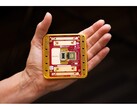Scientists have developed a new approach to optical data storage that could change how much memory we can cram in, using quantum mechanics and rare earth elements. A team from the University of Chicago's Pritzker School of Molecular Engineering and Argonne National Laboratory published their findings in Physical Review Research on August 14.
They use magnesium oxide crystals embedded with rare earth elements that spit out photons at specific wavelengths. To store data, these photons mess around with quantum defects—empty spots in the crystal lattice with unpaired electrons. This system uses wavelength multiplexing to pack more data than regular optical storage, such as CDs and DVDs that hit limits because of light diffraction.
The quantum defects undergo a nearly irreversible spin state change when they soak up energy from nearby rare earth emitters, stabilizing data for long-term storage. The photons they emit are much smaller compared to the 500-1000 nanometer wavelengths used in today's optical storage tech, so that we can achieve storage densities up to 1000 times greater than current solutions.
But even with this big step forward, there are still a bunch of challenges before it can hit the market. The team needs to determine how long these excited states last and how to retrieve the data. Plus, the tech has to work reliably at room temperature since many quantum systems need super-cold conditions close to absolute zero.
"Understanding this near-field energy transfer process is a huge first step," said Swarnabha Chattaraj, a postdoc researcher at Argonne National Laboratory. This breakthrough could eventually lead to ultra-high-density optical storage devices, but there's still a lot of development work ahead before it's ready for prime time.
Source(s)
LiveScience (in English) via APS (in English)














